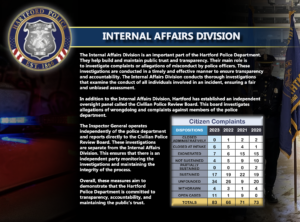Judge Bryant no longer presides over the case; instead Judge Kari Dooley, a Trump appointee, replaces her. Plaintiffs file their motion three weeks before the decree is to be dissolved. It alleges similar failings as the 2018 motion, incorporating the critiques of defendants’ 2019 opposition, and requests that the consent decree be extended until 2032.137 Plaintiffs’ response to the Court’s Order to Show Cause Why the Consent Decree Should Not Dissolve points to the pending motion for contempt, and argues that any progress that has been achieved within the HPD is a direct result of the consent decree. Without it, the department would be even less diverse and accountable in its operations; “With the Consent Decree, the parties can be sure the progress will continue to be at the very least pursued, even if not achieved.”138 Defendants submit opposition to both of these documents, pointing to recent developments within the department such as increasingly strict policies regarding use of force that the HPD instituted during the 2020 protests, the department’s recent accreditation, and their general record of progressive police reform measures in comparison to the rest of the state: “Connecticut law concerning police misconduct has changed substantially as has the City’s approach to the issue. Not surprisingly, the conditions present in 1969 that led to federal jurisdiction are no longer present in 2022. Simply put, over 50 years of litigation has exhausted any basis for continuing jurisdiction over this matter.”139
Two years after the passage of the Police Accountability Act, the Connecticut legislature’s Police Transparency and Accountability Task Force issues a report including further recommendations for accountability measures. They propose several amendments to the Act: “The bill would mandate a study of the impact of school resources officers, define sanctions for police chiefs who fail to report officers who should be decertified for wrongdoing, [and] mandate state accreditation for all police departments by 2025.”140 The most controversial recommendation is forbidding traffic stops for minor violations like a broken tail light. Pulling over reckless drivers is a more important priority for public safety, and one that has little racial disparity, according to a study by the University of Connecticut’s Institute for Municipal and Regional Policy.141 Minor violations like broken lights, on the other hand, become an easy pretext for racial profiling, as extensive research by the Connecticut Racial Profiling Prohibition Project has shown.142 According to a 2021 audit, the project’s conclusions are lower than actual rates of profiling, due to falsified reports by over one hundred state troopers who most likely fabricated records of White drivers stopped from 2014-2021 in order to boost performance measures.143 At least 26,000 stops were falsified, and 58,000 were at minimum inaccurate.144

Pretextual traffic stops constitute a large percentage of race-based police interactions, referred to colloquially since the 1990s as “driving while Black.” Young Black men are over twice as likely to be stopped multiple times in a year than young White men, and likewise for Black women versus White women.145 As Devon Carbado reveals in Unreasonable: Black Lives, Police Power and the Fourth Amendment, “traffic stops open the door to more intrusive searches and seizures, including excessive force.”146 The Supreme Court has upheld pretextual stops, even when the officer explicitly stops someone due to racial suspicion—often on the basis of drug possession. The Court has continually ruled that as long as the officer has probable cause to believe that the suspect has committed a traffic violation, the ulterior motives of the police officer are not relevant.147 The amended Police Accountability Act would, in theory, foreclose this kind of predatory policing, which would prevent a massive number of Black Connecticut residents from becoming involved with the criminal justice system. Not unsurprisingly, the bill died in committee after being met with resistance from conservatives who had already campaigned against the 2020 Act.148
Notes
137. Motion for Contempt, Cintron, et al v. Vaughn, et al, 3:69-cv-13578-KAD (D. Conn. October 10, 2022)
138. Response to Order to Show Cause at 3, Cintron, et al v. Vaughn, et al, 3:69-cv-13578-KAD (D. Conn. October
24, 2022).
139. Defendants’ Opposition to Plaintiffs’ Response to Order to Show Cause and Motion to Dissolve any Consent
Decree at 5, Cintron, et al v. Vaughn, et al, 3:69-cv-13578-KAD (D. Conn. October 31, 2022).
140. Lisa Backus, “Police Accountability Law Revisited With Focus on Motor Vehicle Stops,” CT News Junkie,
March 10, 2022.
141. “Lawmakers Revisit Police Accountability With Focus on Motor Vehicle Stops,” NBC Connecticut, March 9,
2022
142. State of Connecticut Commission on Human Rights and Opportunities, “CHRO Testimony Regarding SB 304 –
AA Implementing Recommendations of the Police Transparency and Accountability Task Force SB 307 – AAC
Prosecutorial Accountability and Priority Given to Cases Prosecuted,” March 9, 2022. See also the CRPPP reports
“Traffic Stop Data Analysis and Findings,” various years, online.
143. “Connecticut State Police Traffic Stop Data Audit Report 2014 – 2021,” Connecticut Racial Profiling Prohibition
Project, June 2023. PDF
144. Amelia Nierenberg, “Over 100 Connecticut State Troopers Accused of Faking Traffic Stops,” New York Times,
September 4, 2023. Note: A 2024 independent investigation indicated that the falsification may have been more
limited than the initial audit suggested. Jaden Edison, “Report: CT State Police Fake Ticket Scandal was ‘Limited’”
CT Mirror, February 1, 2024. Online.
145. Charles R. Epp et al., Pulled Over: How Police Stops Define Race and Citizenship (Chicago: University of
Chicago press, 2014), cited in Devon Carbado, Unreasonable: Black Lives, Police Power and the Fourth
Amendment (New York: The New press, 2022), 77.
146. Carbado, Unreasonable, 77.
147. Ibid., 80.
148. “CT SB00304 | 2022 | General Assembly,” Legiscan, March 4, 2022.

